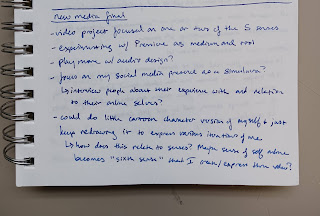Experiments IV/Final Project
Three minutes long. Three people on camera (plus a cat). Three layers removed. I originally wanted this project to focus on a "sixth sense" that we use to explore the digital landscape, but as it progressed I found myself more interested in the way we think about and perceive our identities online. I'm interested in this because I'm not on most social media platforms, and the ones I am on I only joined recently. Most of my friends have been creating and performing their online identities since middle or early high school. I shudder to think of 14-year-old me having an Instagram account. I didn't know who I was or wanted to be. How would I have ever been able to decide what I wanted unknown amounts of strangers to know about me when I knew so little of myself? These days I find the concept of a character or persona that you play in online spaces to be a very interesting idea. I've taken it somewhat literally, and since I've never posted a picture of my fac...




